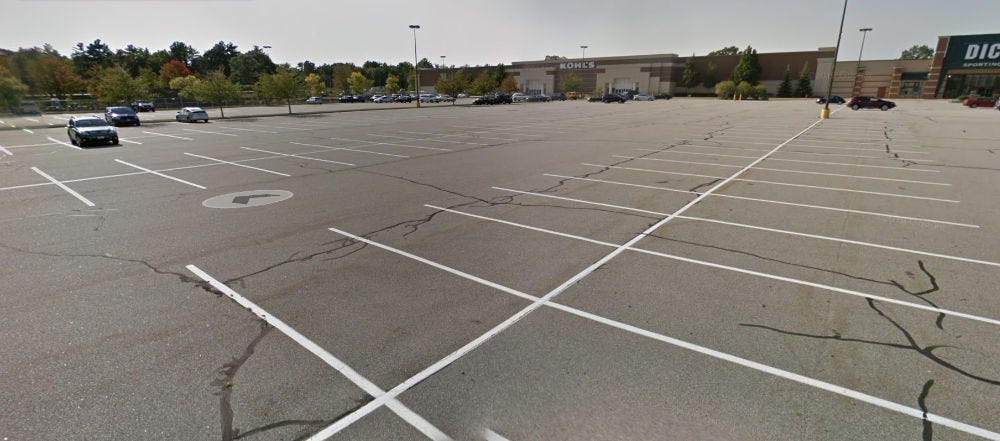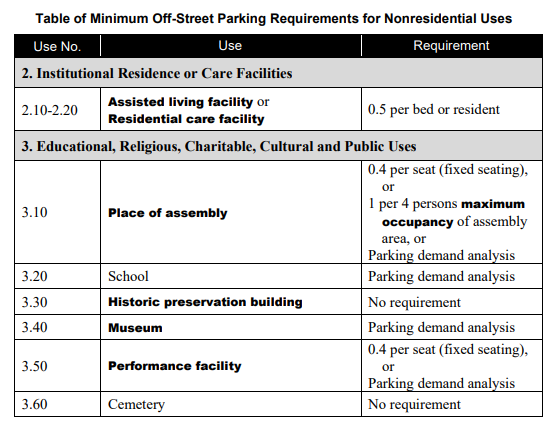Parking Requirements Make Development Harder
Many local governments want to ensure that there is plenty of parking for everyone, but we should take a moment to consider the costs involved in that decision
I've written about zoning in the past and one of our in-person meetings was focused on understanding zoning codes and how they affect city development. A short description of zoning would be a land-use policy that creates zones that each have their own set of rules for land development. These rules can include all sorts of things, but today we are going to be focused on a single rule, parking requirements. I want to discuss how we give special treatment to automobile parking and how this favoritism hurts development in our region.
First, details for our next in-person meeting!
2025 June Meeting Details
Monday, June 9th
6:30PM - 8:00PM
Juniper Kitchen
6 Third St, Dover, NH
Our group has expressed an interest in more topics concerning housing and so we will be discussing a specific residential development in Dover and how the zoning policy has affected it. The owner is trying to convert a single-family residence into a four-family residence and has twice failed to secure a majority vote at Dover's Zoning Board of Adjustment. We want to look at this real-world case of how zoning rules are being applied and the challenges local developers are facing when trying to build new housing. This is meant to be an educational topic and an introduction into this section of city politics that will help our group be more effective in pursuing projects in this domain. If you would like to learn more about this topic please join us!

What are Parking Requirements?
Explained simply, parking requirements dictate the number of parking spots a new development can have. Often this is a minimum number of required spaces, but it can also be a maximum, though this article will be focused on the former. A development could be anything from a single-family home to a hospital, nursing home, restaurant, or retail store. Since zoning is decided per municipality, these requirements will likely vary and you can see these play out differently in each city.
Do Parking Minimums Improve Places?
So, what is the benefit here? The strongest argument for parking requirements is the preservation of on-street parking. The thinking here is that if parking is not required by property owners then they will intentionally off-load parking demand onto the public. At first, this argument seems to have some merits. It makes sense that in some places the cost of providing parking is high and a development that increases the demand for parking should be responsible for offsetting it with additional supply. If that is the case then wouldn't it be logical for cities to enforce this requirement?
This argument is covered in-depth by a Strong Towns article if you are interested. To give a short summary, this type of thinking asserts that parking is not an amenity, but a requirement to creating places. It says that places are incomplete without it, which is of course absurd. Are automobiles the only way to arrive to places? Is there no other way that we can conceive of to transport people from place to place? We just aren't being creative enough if that's as far as our imagination can carry us.
There are better ways to defend a city's parking supply from overuse such as metering or facilitating other forms of viable transportation. I've written in the past on the topic of how much parking is needed for a place and it seems obvious to point out that having abundant parking doesn't guarantee success, and having scarce parking doesn't guarantee failure. We can absolutely build places that succeed with little parking or none at all.
A Look at Parking Math
How would a municipality even begin to calculate how much parking should be required? Well, it all comes down to some fancy mathematics. Let's look at some examples around the Seacoast region.
In Epping's Industrial Commercial Zone they require at least 1 space for every 200 square feet of retail floor space and 1 space for every 250 square feet of office space. (Epping Zoning Ordinance Article 3 Schedule I; p28)
In Portsmouth they require 1.3 spaces per residential unit over 750 square feet and have a useful table that spans 6 pages to refer to for various other uses. (Portsmouth Ordinance § 10.1112.31 - 32; p249)

Even Dover, which has largely removed many of its parking requirements, still has some leftover in places. Its Urban Density Multi-Residential Zone requires 2 parking spaces per residential unit for three- or four-family dwellings. (Dover Code § 170 attachment 5, p2)
Donald Shoup, author of The High Cost of Free Parking, refers to this as "pseudoscience" as there doesn't seem to be any basis for how these numbers are derived. Do you think each and every variant of a retail store should require 1 parking space for every 200 square feet of retail space? How is it possible to know how much parking demand a retail store will create just based on its size? What about these residential units in Dover that require 2 parking spaces for each unit? Are we confident that every unit will be a two-car household or are we just giving it a best guess?
Parking Requirements Make Development Harder
At its core this is another form of automobile bias built into our city policies. What these policies are actually doing is mandating that the private sector subsidize automobile ownership by providing dedicated space throughout the city. Also, each parking spot that is required becomes a barrier to entry for development in your town. When having to build parking is directly tied to square footage of your development, it creates an incentive to reduce square footage in developments to avoid having to purchase more parking.
It makes developments financially weaker as it increases the cost of development, and prevents developers from maximizing value with their land because the parking math says they have to leave parts of it empty and available for automobile storage. Furthermore, it lowers the potential return to the city as parking lots do not pay much in tax revenue. That means that excessive parking costs more and brings little return to either the city or the developer, a lose-lose scenario.
Who then shoulders that cost? Developers usually avoid doing business at a loss and will pass on those expenses to the next person, the renters, the people shopping at our retail stores, home-buyers, etc. The price of that parking manifests in our everyday expenses and it is important to remember that there is no such thing as "free parking".
This isn't just some hypothetical either, The American Planning Association wrote about the benefits that they found in areas that have removed parking mandates. In Champaign, IL they removed minimum parking requirements in the university district and in residential areas in the downtown and midtown districts. Afterwards they found that it reduced development costs and increased residential density in downtown.
In another article they talk about the "immediate impact" eliminating parking minimums had on the number of developments that cities would see popping up. Strong Towns as published a video that has interviews with local business owners in Fayetteville, Arkansas who talk about how the removal of parking minimums allowed them to open new businesses in the city.
Conclusion
There are many assumptions and best intentions wrapped up in zoning codes and alleviating parking demand is just one of them. What many zoning requirements end up doing is removing flexibility from a community in how it can change. That flexibility is valuable when responding to external pressures, economic changes, demographic changes, and without it we can see more rigidity and fragility in our places. Let's build stronger places by being more flexible and letting our own communities invest in themselves with the amount of parking that they want to provide.




"
The strongest argument for parking requirements is the preservation of on-street parking.
“
No.
Parking minimums exist to mitigate externalities. Otherwise you have situations like in my neighborhood where people park in the bike lane at the vegan place that has no off-street parking. Or they park in the lot across the street from the donut place. That shifts the cost of parking from those that benefit from the driver to either other businesses or the public.
That’s right, parking mins are a proxy for drivers to pay for their parking.
Let’s not be so foolish as to throw the baby out with the bathwater.